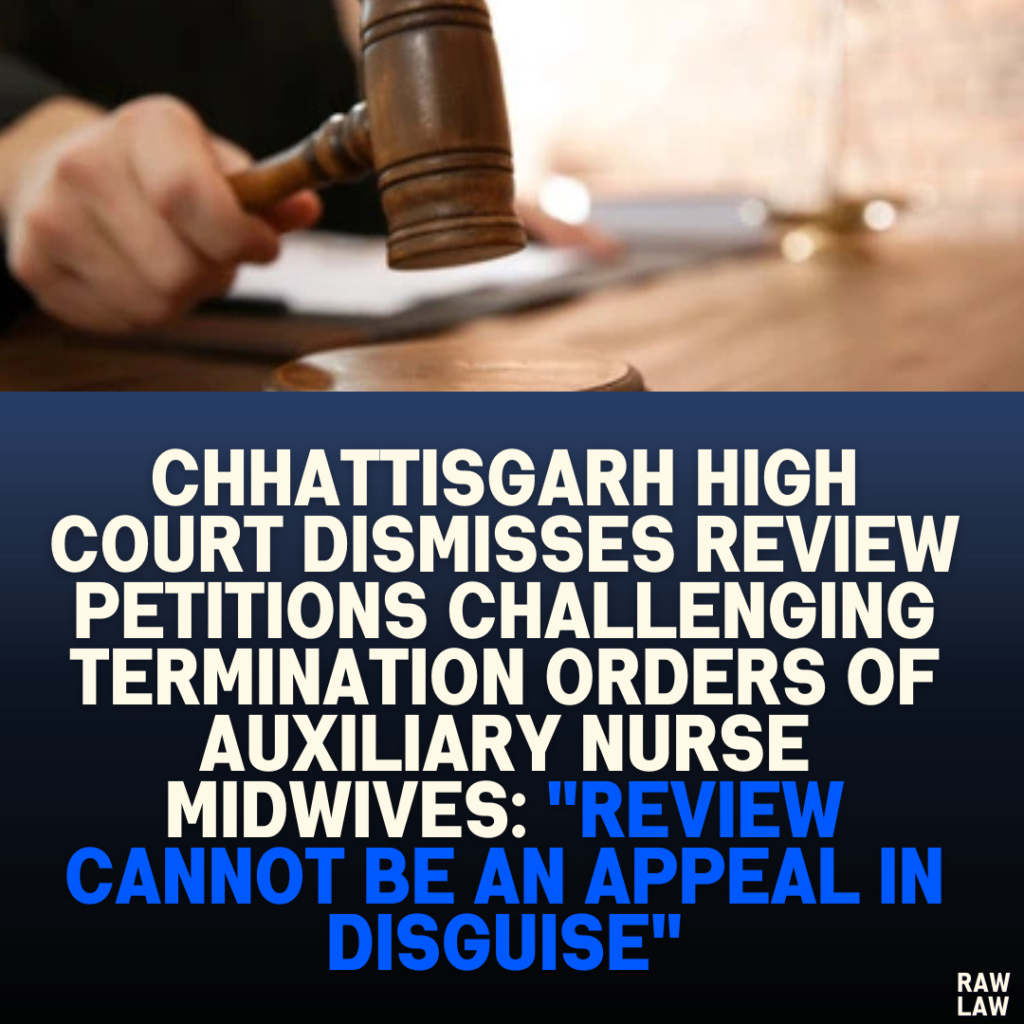Court’s Decision
The Chhattisgarh High Court dismissed two review petitions filed by the State seeking to recall the court’s earlier orders in favor of Auxiliary Nurse Midwives (ANMs) terminated during their probation. The court ruled that the State’s plea did not meet the criteria for review under Order 47 Rule 1 of the CPC, which allows review only on specific grounds such as new evidence or an apparent error of law. The court emphasized, “The scope of review is limited and cannot be allowed to become an appeal in disguise.”
Facts
- Background of Termination: The respondents (ANMs) were appointed on probation for two years to sanctioned posts. However, they were terminated on the grounds that the appointments exceeded the sanctioned number of positions.
- Probationary Clauses: Their appointment orders included conditions that allowed termination during probation without inquiry, stating the employment was temporary and could be terminated with notice or one month’s salary.
- Procedural Shortcomings: The termination orders were issued without an inquiry or opportunity for the respondents to be heard, which they challenged as a violation of natural justice.
The writ petitions filed by the ANMs were allowed by the court in November 2023, and their terminations were set aside. The State subsequently filed review petitions, arguing that critical facts and legal arguments had not been presented earlier.
Issues
- Did the termination orders comply with the legal requirements for terminating probationary employees?
- Did the grounds raised by the State meet the criteria for review under Order 47 Rule 1 of the CPC?
Petitioner’s (State’s) Arguments
- Probation Terms: The petitioners argued that the respondents were temporary employees on probation, and their appointments could be terminated without the need for inquiry.
- Irregular Appointments: They claimed that the appointments exceeded the sanctioned number of positions and were, therefore, irregular.
- Financial Impact: The petitioners expressed concern that reinstatement might set a precedent, leading to similar claims from other employees, causing financial loss to the State.
- Grounds for Review: They argued that essential clauses of the probation terms and the financial implications had not been adequately considered in the original judgment.
Respondent’s (ANMs’) Arguments
- Validity of Appointments: The respondents asserted that they were appointed to sanctioned and vacant posts following proper procedure, including a merit-based selection process.
- Violation of Natural Justice: They contended that their termination violated natural justice principles as no inquiry was conducted, nor were reasons provided for their dismissal.
- Inconsistency in Review Pleas: The respondents argued that the grounds raised in the review petitions were new and had not been included in the original proceedings, making them ineligible for consideration in a review petition.
Analysis of the Law
The court analyzed the legal provisions and principles governing review petitions:
- Order 47 Rule 1 CPC: This allows review only on specific grounds, such as:
- Discovery of new and material evidence that was not available earlier.
- An apparent error of law on the face of the record.
- Any other sufficient reason, provided it is not a disguised appeal.
- Section 114 CPC: Grants courts the power to review judgments under limited circumstances, reinforcing the principle that review is not a rehearing.
The court cited multiple precedents:
- M/s Northern India (India) Ltd. v. Lt. Governor of Delhi: A plea for review cannot serve as a re-litigation tool.
- Parison Devi v. Sumitri Devi: Errors requiring reasoning to detect are not eligible for review.
- Sajjan Singh v. State of Rajasthan: Judgments cannot be reviewed merely to seek a fresh decision.
Precedent Analysis
The court applied the following key judgments:
- Parison Devi v. Sumitri Devi (1997): Highlighted that a review cannot function as an appeal and must be limited to self-evident errors.
- M/s Shanti Conductors (P) Ltd. v. Assam State Electricity Board (2020): Reiterated that review petitions cannot be used to reargue issues already decided.
- Sajjan Singh v. State of Rajasthan (1965): Confirmed that finality of judgments cannot be compromised unless there is a compelling reason.
Court’s Reasoning
- No New Grounds: The court noted that the grounds cited by the State in the review petitions were not raised during the original writ proceedings.
- Procedural Violations: It found that the ANMs were terminated without inquiry or notice, contrary to the principles of natural justice.
- Scope of Review: The court reiterated that review is not a second appeal and cannot be used to reargue matters already decided.
The court also observed that its earlier judgment allowed the State to take appropriate action in accordance with the law, safeguarding its interests.
Conclusion
The court dismissed the review petitions, holding that:
- There was no error apparent on the face of the record in the original judgment.
- The grounds for review amounted to re-litigation and were unsustainable.
- Procedural safeguards for employees, even probationers, must be upheld.
The court remarked, “The law laid down must rest in peace,” emphasizing the finality of judgments.
Implications
- For Employers: The judgment reinforces the necessity for procedural compliance, even for terminating probationary employees.
- For Review Mechanisms: It limits the misuse of review petitions to reargue cases, maintaining judicial efficiency and finality.
- For Employees: It upholds the rights of probationary employees against arbitrary termination, ensuring adherence to principles of natural justice.
This detailed explanation adheres to your request for an in-depth and structured summary while excluding party names.



